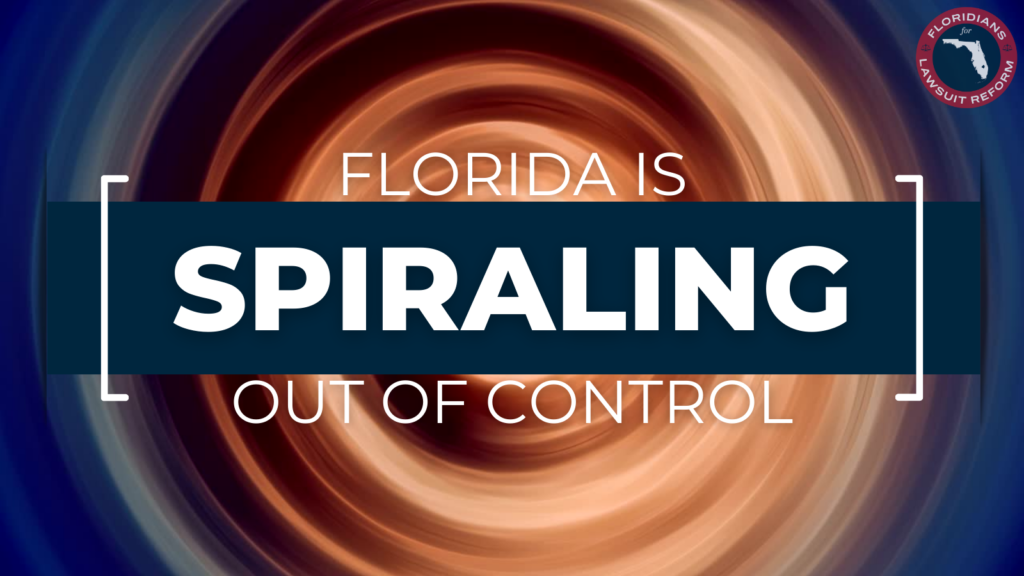
A crumbling Florida homeowners insurance market will likely not stabilize any time soon.
Tens of thousands of homeowners statewide are at risk of losing their insurance policies, as dozens of regional carriers face potential rating downgrades that would deem these companies financially unstable and unable to adequately pay claims.
That’s because insurers are bleeding, primarily caused by fraudulent roofing schemes, increasing replacement costs and limited legislative oversight. In 2020, Florida’s insurance companies reported $1.6 billion in underwriting losses.
Now, companies are shedding high-risk properties — leaving thousands of Florida homeowners scrambling to find insurance coverage in the midst of hurricane season.
“The Florida private homeowners insurance market is on a trajectory toward collapse, and it appears to be escalating,” said Mark Friedlander, spokesperson for the Insurance Information Institute, a nonpartisan association that provides insurance education and research.
“The fact that so many companies have stopped writing business tells us that the market is spiraling downhill faster than previously,” Friedlander said.
Florida homeowners insurance market
Twenty-seven Florida insurers could face a rating downgrade by Demotech, Inc., an Ohio-based financial strength ratings agency that oversees 40 carriers statewide.
These downgrades could leave thousands without homeowners insurance, Friedlander said, because federal mortgage loan guarantors — Fannie Mae and Freddie Mac — require borrowers to have coverage with A-rated insurers.
Demotech had planned to release its ratings revisions Tuesday, but said in a statement to the USA TODAY Network – Florida that it is taking more time to update the ratings.
Moreover, the Florida Office of Insurance Regulation released a report indicating 27 insurers are on a “watch list” and are having financial issues, Friedlander added.
It is unknown whether the 27 companies on both Demotech and the Office of Insurance Regulation’s respective lists overlap, as no carriers were named.
That’s on top of the four insurance companies that have already liquidated this year, and another 13 that have stopped writing policies in Florida, Friedlander said, in what he referred to as the “largest mass downgrade of insurers in U.S. history.”
“We’ve never heard of a number that high before,” he said. “That’s unprecedented. Not only in Florida, in the United States. We’re very concerned as to where the market is heading and how fast it is collapsing.”
How does this affect homeowners?
Up to 400,000 Florida homeowners have been dropped or received policy non-renewal letters so far this year, Friedlander said.
Many more are expected as insurance carriers face downgrades, Friedlander said. There is no way to know how many, but he predicted it will be in the tens of thousands.
“Most Florida homeowners do have their insurance coverage with these smaller, regional carriers,” he said. “When you add that up, it’s going to have significant impact.”
Homeowners insurance premiums are up an average 33% year-over-year, he added. Florida also has the highest average premium nationwide, at $4,231 — nearly three times higher than the U.S. average of $1,544.
According to the Office of Insurance Regulation’s July Property Insurance Stability Report, Treasure Coast homeowners pay an average insurance premium of:
- $4,373: Martin
- $3,144: Indian River
- $2,509: St. Lucie
Those who can’t afford these skyrocketing prices turn to Citizens Property Insurance Corp., a state government agency that covers those unable to find affordable policies in the private market.
Citizens has seen a 29% increase in policies this year, said spokesperson Michael Peltier, and now manages about 977,0000 policies. The agency expects that number to continue increasing throughout the year, Peltier said, likely reaching 1.2 million. That’s without any liquidations, he added.
The Office of Regulation also announced Wednesday that Citizens will temporarily reinsure homeowners in the event carriers are downgraded by Demotech to ensure there’s no lapse in coverage during hurricane season.
Providing downgraded companies with reinsurance will make their policies acceptable to Fannie Mae and Freddie Mac, according to a news release.
When will homeowners see relief?
This recent escalation comes after Florida Gov. Ron DeSantis called a special legislative session in May to combat the homeowners insurance crisis.
New legislation steered $2 billion of taxpayer money into a fund to help insurers pay hurricane damage claims, limit lawsuits against companies and have homeowners shoulder more of the cost for roof replacements.
Even still, homeowners shouldn’t expect to see relief any time soon, Friedlander said.
“We certainly don’t have a crystal ball, but our assessment is the Florida insurance crisis will continue to worsen,” he said. “We do not see a bottom at this point, unfortunately.”
